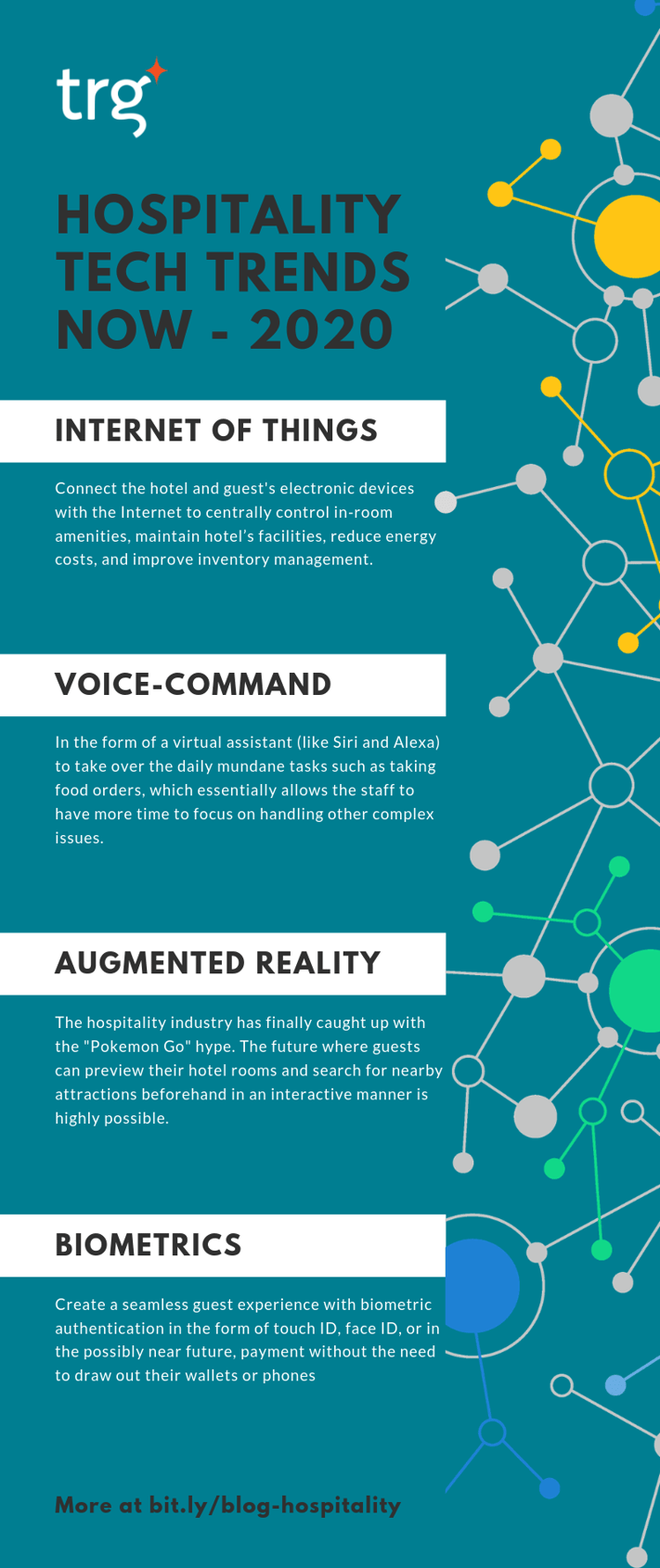More people travel now than ever. In a study conducted by Amadeus, 83 per cent of respondents strongly agreed or agreed that “People will view travel as a right rather than a luxury and consider it an increasingly important part of their lives.”
This in conjunction with the fact that one-third of the world’s hotel guests today are tech-savvy Millennials who have strong desires for truly unique travel experiences. From now until 2020, the following 4 technologies will continue to evolve to help the hoteliers be better at what they are doing: being hospitable.
Read more: How Hoteliers Cope with the Rise of the Sharing Economy
4 trends revolutionising the hotel technology landscape in 2020
Every step of the entire guest journey can be optimised with the right technology. Hotels should aim at pleasing the customers before they even think of booking a room. “Personalisation” is the keyword that hotels should focus on for the next few years.
The infographic below summarises the 4 prominent technology trends that will continue to disrupt the hospitality industry in the next two years.

1. Internet of Things (IoT)
Connect the hotel and the guest's electronic devices with the internet to centrally control in-room amenities, maintain facilities, reduce energy costs, and improve inventory management.
Green hotels and smart energy management solutions will be widely adopted in hotels regardless of sizes. Electricity accounts for 60% of the total expenditures. Smart technology can help lower the expense as much as 20% while at the same time improve the guest experience.
The Internet of Things (IoT)’s sensors allow hotels to track occupancy patterns, optimise the HVAC consumption, and in turns, improve the overall energy consumption throughout the year.
The network of connected things also empowers hoteliers to push menu notification at the right time (for example when the guests are in their rooms) to make personalised suggestions based on the guests’ past orders.
Read more: Transforming the Hospitality Industry with the Internet of Things
Data acquired also helps hoteliers to understand the hotel guests’ experience journey and their preferences: setting the right temperature for their room before they come in, dimming the lights when it's their bedtimes, run the shower to the right temperature, turn off all equipment when no one's in the room.
2. Voice-Command Technology
In the form of a virtual assistant (like Siri and Alexa) to take over the daily mundane tasks such as taking food orders, which essentially allows the staff to have more time to focus on handling other complex issues.
The voice-command and natural language processing technologies have flourished recently. Big names in the tech industry have restlessly produced virtual assistants that are not only smart, intuitive but also equipped with personalities to interact with the users.
Wynn Las Vegas was one of the first in the industry to equip all of its 4,748 hotel rooms with Amazon’s Alexa. Best Western Hotels & Resorts also began to implement Amazon Dot devices for both guests and staff earlier last year.
Voice-enable technology empowers the guests to be in control as they are given the ability to adjust the room conditions, request services, set reminders, and many more. Placing orders via the virtual assistants is also more accurate which enables the staff to respond to the guests’ requests in a timely manner.
3. Augmented Reality (AR)
The hospitality industry has finally caught up with the "Pokemon Go" hype. The future where guests can preview their hotel rooms and search for nearby attractions beforehand in an interactive manner is highly possible.
AR may be popular in the gaming and entertainment industry but there is a possibility to utilise both AR and its close relative Virtual Reality (VR) to increase pre-booking conversion with "long-range guest visit" function.
What this essentially means is this particular function enables the “gamification” of the travel experience, helps guests to visualise the property, explore individual rooms or take a look at the surrounding neighbourhood or nearby attractions prior to booking.
Back in 2012, in order to prepare for the Olympic and Paralympic Games, Holiday Inn launched the world's first augmented reality hotel campaign which enabled guests to see a "realistic" virtual images of sports celebrities with their smartphones.
Read more: Providing Stellar Service for Hotel Guests with Social Collaboration Tool
4. Biometrics Authentication
Create a seamless guest experience with biometric authentication in the form of touch ID, face ID, or in the possibly near future, payment without the need to draw out their wallets or phones.
Biometrics adoption has grown steadfast in the past years with fingerprints scanning being the most popular use. Apple has been very successful in utilising biometric authentication (facial recognition) for locking/ unlocking their iPhones.
In the hospitality context, registering the guest’s biometrics (fingerprints or facial features) into the hotel management system can shorten the check-in/ check-out procedures and provide guests with instant access to rooms and other facilities that they've booked without the need for keys, cards or mobile apps.
The system also records guests’ preferences which are useful and is the fastest way to identify returned guests.
The hospitality industry developing its own mobile apps
The “app culture” among the tech-savvy, always-on generation today makes them believe they can find the answer through an app; and if there is no app available, they’ll take the problem online, i.e. they’ll post it on social networks to openly discuss it.
Thus, the hospitality industry is faced with the challenge of keeping up with the changing in customer’s demand and behaviours in addition to keeping pace with technology advancements.
Hilton Hotels in Germany and UK have developed a mobile app to enhance the hotel guest experience journey. Through the app, guests can book a room, access their booking info, preview their room images, get updated on special promotion, or contact the hotel directly with the “click to call” feature.
The app can include remote check-in feature which is not only convenient for the guests but also can help hotels to manage/ predict staffing needs better. By knowing when the guests will arrive, the staff can greet the guests and offer them with appropriate upgrades/ upsells which gives off a more personalised vibe, particularly important if this is the first time the guests visit your hotel.
At the end of their stay, guests can once again seamlessly check themselves out, arrange transportation from the hotel to airport, or reserve a spot for their next activities via the mobile app.
Despite the strong emphasis on technology, the human element still plays a vital role in ensuring the hotel’s competitive advantage. Hoteliers should focus on training their employees the importance of protecting highly sensitive data, and utilise their knowledge about the local delicacies (local flavours, art and brands) to offer to the guests. Genuine hospitability backed by technology will and can equate to a memorable experience.
The hospitality industry and the IoT
IoT represents the ability to connect any physical object with the internet. It has been used in many household appliances in (what we call today) “smart houses”.
Many hotels have already implemented some forms of IoT to centrally monitor guest room temperature through sensors installed in the thermostats or HVAC systems. This allows hotels to reduce the energy costs of cooling or heating vacant rooms.
Furthermore, IoT plays a critical role in providing utmost comfort, seamless hospitality experience and a luxurious stay for the guests by utilising the data acquired during their previous stay. For more information about IoT in the hospitality industry, please refer to this article.
 English
English  Vietnamese
Vietnamese 

